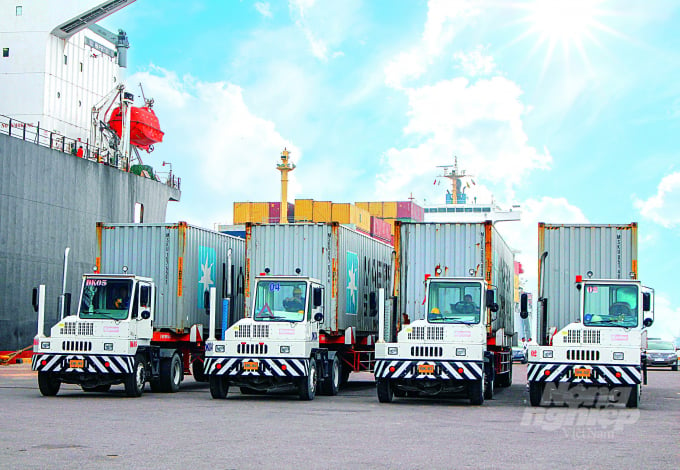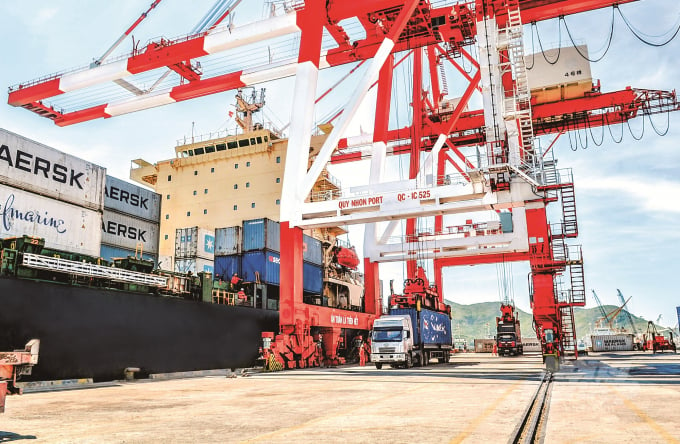June 1, 2025 | 07:32 GMT +7
June 1, 2025 | 07:32 GMT +7
Hotline: 0913.378.918
June 1, 2025 | 07:32 GMT +7
Hotline: 0913.378.918

Enterprises now do not need to go to the Plant Quarantine Sub-Department of Region IV to carry out the customs clearance procedures. Photo: VDT.
According to Pham Duc Anh, Director of the Plant Quarantine Sub-Department of Region IV (Plant Protection Department) located in Quy Nhon City (Binh Dinh Province), the issuance of phytosanitary certificates to import goods is being conducted virtually on the NSW system by the unit.
Since the application of the service via the online system, 100% of dossiers have been resolved quickly without encountering any backlog.
According to Anh, the Plant Protection Department has an interactive software to receive registration for any procedure, for example, the procedures for import phytosanitary, phytosanitary inspection of food safety, quality control of imported animal feed, or phytosanitary export, to smoothly carry out the above task.
Thanks to the above system, goods importers who want to pay fees via bank transfer do not need to go to the phytosanitary agency for customs clearance.
Customers only need to coordinate with officers from the field department at the port, check and take samples of goods subject to plant quarantine. When the status of the goods has been verified and the certificate has been submitted through the NSW system of the Customs office, the shipment is cleared.
The director said the administrative reform has been implemented smoothly thanks to close and timely instructions of the Plant Protection Department (under the MARD).
Accordingly, the Plant Quarantine Sub-Departments under the Plant Protection Department have reports to update the data monthly, quarterly and annually.
In addition to periodical reports, the departments must also make irregular reports if any problems arise, and if there are problems, the Plant Protection Department will issue directions and handle them promptly.
“Every quarter, the governing body inspects the quality of administrative reform implementation within the NSW mechanism of its affiliated units, checking the frequency of businesses, individuals and organizations participating in the import and export of goods subject to plant quarantine come to the headquarters of the competent authority for work and how the issues are resolved.
“Since the administrative reform has been implemented via the NSW mechanism, the documents are almost instantaneously transferred from the plant quarantine agency to the relevant agencies for customs clearance of goods,” Anh said.
In addition to the application of Laws and Circulars, the Plant Protection Department also has its own guidelines and regulations in implementing administrative reform so that its affiliated units can accelerate the release of consignments that have met phytosanitary requirements.

Reduced import and export procedures due to administrative reform via the National Single Window mechanism have eased the clearance of imported goods in Quy Nhon port. Photo: VDT.
Anh added that the administrative reform still has some small difficulties, especially in terms of transmission lines, meaning that the transmission is blocked at times but the network operator promptly fixes it after that.
In addition, the system at border gates is not synchronized, so online services cannot be performed.
The administrative reform via NSW mechanism has initially shown that the necessary procedures have been reduced, helping to speed up the release of goods while still ensuring the professional requirements of the phytosanitary industry.
All shipments that have met phytosanitary requirements have quickly had their procedures completed faster than before, when paper records were still applied.
In addition, the storage of records and documents has also become more convenient than before. In particular, it helps import and export enterprises to save up a lot of costs while minimising their travel in the context of COVID-19 pandemic.
In the remaining months of 2021, the Plant Quarantine Sub-Department of Region IV will continue to implement the general direction of the Plant Protection Department in the application of administrative reform via the NSW.
Leaders and officers of the Sub-Department are therefore requested to make every effort to perform their tasks properly to create the best possible conditions for the import and export businesses.
Meanwhile, many appropriate solutions must be flexibly applied but must comply with industry regulations in the context of the COVID-19 and necessarily prevent any potential backlog.
Translated by Luong Huong
/2025/05/29/5625-12-214801_567.jpg)
(VAN) Provincial mergers in the Mekong Delta promise to streamline administration, expand inter-provincial raw material areas, and foster close linkages in agricultural value chains, benefiting both businesses and cooperatives.

(VAN) Merging Mekong Delta provinces contributes to the expansion of agricultural raw material areas, addressing previous constraints caused by provincial boundaries. Additionally, this expansion will reduce costs and strengthen linkages between businesses, cooperatives, and farmers.
/2025/05/29/1043-2-153730_145.jpg)
(VAN) The Government's policy to merge provincial-level administrative units opens up major opportunities for the Mekong Delta region to reshape its agricultural development strategy toward large-scale production, effective regional linkages, and sustainability.

(VAN) The mutual export of agrifood products between the European Union (EU) and the United Kingdom (UK) must occur again without certification, border controls or other red tape. This was agreed at the UK-EU summit.
/2025/05/22/5121-2-173645_677.jpg)
(VAN) NBSAP Tracker identifies strengths and areas for improvement in the National Biodiversity Strategy, based on each region’s priorities and capacities.

(VAN) The draft amendment to the Circular on rice export trading stipulates a periodic reporting regime for rice exporting enterprises.

(VAN) Dong Thap farmers attained an average profit margin of 64% during the summer-autumn 2024 crop (first season), while An Giang and Kien Giang farmers followed with 56% and 54%, respectively.